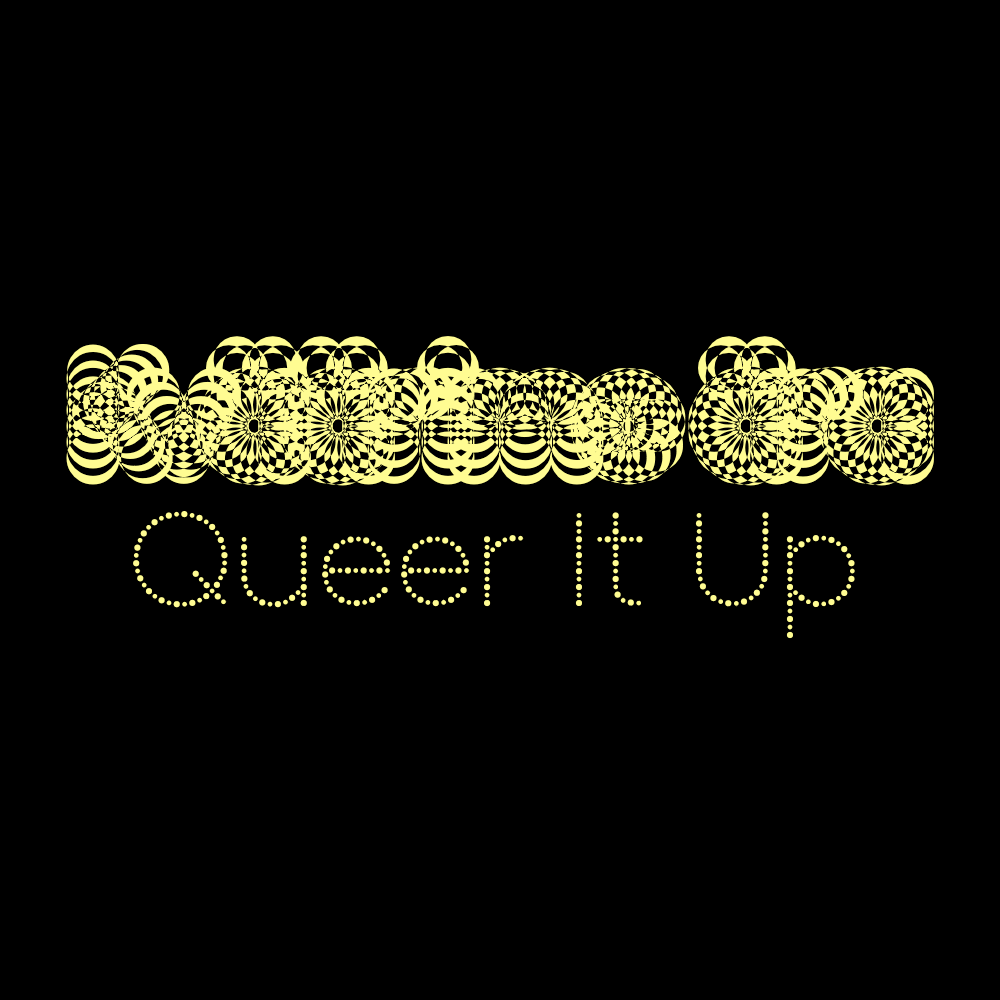2023 programme
3.2.2023 — 13.1.2024
Queer It Up
In 2023, the exhibition and public programme will be introduced under the title Queer It Up, as a kind of ‘vibe’, using this encouraging slogan as a platform to celebrate all that is positioned as fluid, different, unidentifiable, glitchy, marginal and uncomfortable. American cultural theorist and poet Fred Moten has said that the normative is the after-effect, it is the response to the irregular. Living in the times of the so-called new normal, greatly influenced by the global pandemic, war, nuclear threats, climate crises, the re-emergence of more radical movements of nationalism seems like the right time to talk about some serious queering of our perspective. It is time to take the opportunity and eliminate the concept of normality as an unfruitful way of thinking altogether.
Queer It Up, according to the Urban Dictionary, questions the dominance of heteronormativity and discusses the social and cultural norms of gender, sex and sexuality. Although very much inspired by its original meaning, Kogo Gallery would like to expand this beyond gender performance or non-performance, incorporating also the topics of friendship, nature, magic, art and failure as important actors in our lives. These provide the nourishment our minds need and often trigger explosive creativity, fill our spirits with empathy, teach us about our common complex past, and transform the notion of our bodies into a more liquid and connected entity.
The project opening the programme will be Brigit Arop’s curated group show of Baltic artists Greetings, and Whatever Customarily Restores a Bond About to Break with artists Anna Trell, Cloe Jancis, Diāna Tamane and Agnė Jokšė. The exhibition touches on the many meanings of female friendship, which are shaped by personal experiences, the tension between ideals and reality, cultural representations and personal as well as socio-cultural expectations. Often there is a gender bias about the ability to form genuine relationships, perceiving women as meanwhile men are seen as noble and loyal. Exploring friendship from a female perspective, the exhibition aims to encourage people to think about friendship as something genderless and potentially political that could make society more empathetic and egalitarian.
Continuing the important topic of connectivity, the next exhibition by Estonian artist Kristina Õllek will centre on the study of anthropogenic impacts in the Baltic Sea, specifically focusing on cyanobacteria and changing marine ecology. Unfortunately, the Baltic Sea is one of the world’s most polluted seas due to intensive agriculture, hazardous substances, domestic and industrial wastes, marine litter and underwater noise that has affected its ecosystem. It is a semi-enclosed sea with a slow water exchange and its recovery capacity is, therefore, relatively limited. Õllek will look at the geological and chemical changes of the Baltic Sea through the speculative future and sedimented past – looking through marine sedimentary rocks from several hundred million years ago. Working with limestone, sea salt, cyanobacteria, bioplastic and other organic and inorganic materials, the artist will create a new spatial installation.
The summer season will start with Šelda Puķīte’s curated exhibition built as a magical triune knot by Latvian artists Elīna Vītola and Sabīne Vernere and Estonian artist Darja Popolitova. Just like nature and gender identity, magic has been looked upon as part of a dangerous chaos that exists outside the normative. What is forgotten in the midst of prejudice is that magic presents spiritual connectivity, imagination, an openness to experimentation and play, and the urge to protect. Women and magic have a long history connected by practical knowledge, spiritual wisdom as well as stigmatisation; the same can be said about nature and art. They are entities on broad spectra that make them seem abstract, out of control, and therefore, suspicious. At Kogo Gallery, the artists will create a spatial triquetra, consisting of three spectra – art, nature and magic – that together will form powerful murals, artist’s visions of the modern world that together aim to create a protective charm for the future of the world.
After Kogo Gallery has been magically activated, it will be turned into a performative space by the Baltic Drag King Collective, a fluid community of performance artists that use drag as a platform for deconstructing and reinventing gender, educating society and bringing visibility to the LGBTQ+ community. They will focus on the performance of masculinity and the representation of female, trans and non-binary identities. The exhibition, curated by Latvian artist Mētra Saberova, will consist of photographic and video material from the ongoing activities of the Baltic Drag King Collective, with individual contributions from its members. It will showcase both the scope of their performances and their varied and distinct approaches and motivations for dwelling in the world of drag and the contested world of gender roles and their disruption.
Kogo’s autumn programme will continue with a solo show by Ukrainian artist Alina Kleytman, who is representative of a strong new generation of Ukrainian female artists working today. In her works, she explores topics of sexual emancipation, violence and the degradation of modern society. She evaluates the Eastern European identity through a feminist and personal perspective using mostly video and installation as her media. Kleytman was born in 1991 in Kharkiv, Ukraine. Since 2009, she has participated in exhibitions in Ukraine and abroad, was a nominee of the Pinchuk Art Prize 2011 and a winner of the Non Stop Media Biennial. Kleytman has created several queer performance shows and founded the curatorial group Wet Hole in collaboration with Nikita Kadan and Bogdana Kosmina.
The programme is funded by the Cultural Endowment of Estonia and the City of Tartu.


 Common Threads, Polar Bear and Elephant
Common Threads, Polar Bear and Elephant